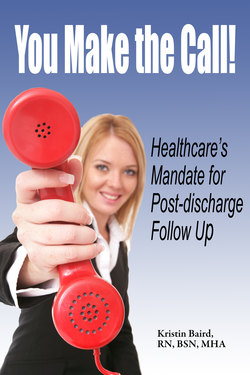Читать книгу You Make the Call - Healthcare's Mandate for Post-discharge Follow Up - Kristin Boone's Baird - Страница 11
На сайте Литреса книга снята с продажи.
Reason #3—Deliver service recovery
ОглавлениеThe third essential reason many hospitals conduct PD calls is to implement service recovery measures. It’s been established that inpatients are a captive audience. While they have options for which organization to visit in their time of need, and they are certainly more educated about expectations in this electronic age, the majority of inpatients are only seeking care out of necessity. Furthermore, they come through a hospital’s doors in a heightened emotional state and are filtering their perception of service through a subjective lens. Quality is in the eye of the beholder.
Despite good intentions in your customer service delivery, some service issues are inevitable. Issues may vary in scope and size, but they are guaranteed to influence a patient’s experience and how she views your responsiveness to her needs. In a hospital setting where patients and their families interact with dozens of your team members across multiple departments and shifts, you may not even realize what messages are being sent to them or how they are received, let alone when something goes wrong.
Although many organizations try to find service recovery opportunities during rounds, some patients report being hesitant to vocalize concerns due to fear of retribution from the staff. Whether real or perceived, patients may not want to discuss service issues until they are no longer in your care.
If a patient is satisfied with his experience, it is likely he will tell two to three of his friends and family members about it, leading to positive brand reinforcement and the increased likelihood for loyalty and referrals. However, if that patient feels you did not handle a service issue in an appropriate or timely fashion (maybe it wasn’t addressed at all), it is almost guaranteed the patient will tell beyond two or three people about it. At that point, without even realizing there was a problem, you stand to jeopardize future business with the patient again and everyone he shared his bad review with. And consider the negative potential of online social networking media, spreading news like wildfire.
Placing PD calls provides an opportunity to identify and address such service issues swiftly and effectively. Within that first 24 – 72 hours after heading home, the experience is still fresh in a patient’s mind. By calling patients proactively, you demonstrate having their best interest in mind and wanting to gain information that will not only help you repair your relationship with them but also make changes before problems become widespread.
The bottom line is it really all comes down to trust. You think you’re in the healthcare delivery business—you deliver medical services, make people better, and send them home. But it’s important to remember that you’re really in the business of trust. When people enter your hospital for care, they are placing their trust in you. That is the sacred bond you enter into with your patients. And you can never forget how sacred and fragile patient trust is. PD calls give you an opportunity to solidify a trusting relationship.
